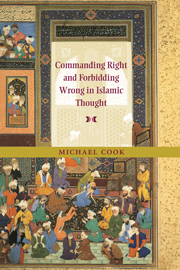Book contents
- Frontmatter
- Contents
- Preface
- Acknowledgements
- PART I INTRODUCTORY
- PART II THE ḤANBALITES
- PART III THE MU'TAZILITES AND SHĪ'ITES
- PART IV OTHER SECTS AND SCHOOLS
- PART V BEYOND CLASSICAL ISLAM
- APPENDIX 1 Key Koranic verses and traditions
- APPENDIX 2 Barhebraeus on forbidding wrong
- Bibliography
- Postscript
- Index
APPENDIX 2 - Barhebraeus on forbidding wrong
Published online by Cambridge University Press: 07 December 2009
- Frontmatter
- Contents
- Preface
- Acknowledgements
- PART I INTRODUCTORY
- PART II THE ḤANBALITES
- PART III THE MU'TAZILITES AND SHĪ'ITES
- PART IV OTHER SECTS AND SCHOOLS
- PART V BEYOND CLASSICAL ISLAM
- APPENDIX 1 Key Koranic verses and traditions
- APPENDIX 2 Barhebraeus on forbidding wrong
- Bibliography
- Postscript
- Index
Summary
Gregory Barhebraeus (d. AD 1286), though best known to Islamicists as a historian, contributed broadly to the Syriac literature of the Jacobite (West Syrian) church. The work that concerns us here is his Ethicon. A characteristic feature of this book is its extensive dependence on the Iḥyā'ulūm al-dīn of Ghazzālī (d. 505/1111). Given this fact, it is no surprise to find thatthe chapter that Barhebraeus devotes to admonition (martyānūtā) and rebuke (kuwwānā) is essentially a Christian recension of Ghazzālī's account of forbidding wrong.
This relationship is not in evidence in the first two of the five sections of the chapter, to which I will return for just that reason. But it is transparent in the last three. The third section is concerned with the ‘elements’ (estūkse') of rebuke. As in Ghazzālī's account, there are four: (1) the rebuker (mkawwnānāa); (2) the rebuked (metkawwnānā); (3) the offence (saklūtā); and (4) the manner of rebuke (znā d-kuwwānā). Within the latter, there are seven levels (dargē), which correspond to Ghazzālī's eight with some differences. The fourth section offers a conspectus of sins classified into five kinds. The first kind (gensā) are those that occur in churches, the second in shops (ḥānwātā), the third in streets (plātawwātā), the fourth in baths and the fifth at banquets. These correspond well to Ghazzālī's categories of wrongs.
- Type
- Chapter
- Information
- Commanding Right and Forbidding Wrong in Islamic Thought , pp. 600 - 603Publisher: Cambridge University PressPrint publication year: 2001



